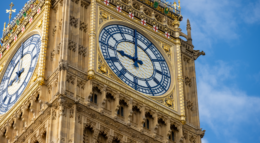
Economic gloom-mongering? Tosh. We're booming
With employment up, foreign direct investment at record levels and a bright future ahead for Britain, the only thing holding the UK back is the pessimism of the Remoaners, argues Rory Broomfield
Let's just think for a second. Whenever you watch the news, read the newspaper or listen to the radio (or do all of those things, just online), do you *actually* read bad news because of Brexit?
Do you hear about unemployment spiraling out of control, foreign investors *actually* fleeing the UK or a crash in the stock or housing markets? Or, do you just hear the same old fear mongering from the same people that were proved wrong and whose tall tales were rejected by the British public?
Well, since last year the British people and its economy have confounded the likes of George Osborne and have, as a result, allowed for the economy to storm ahead compared to what the prophets of doom were predicting.
Let's take a look then at the facts.
Underneath were a number of claims that George Osborne made last year, which analysis by the pro-Brexit group Change Britain shows were incorrect. Indeed, their analysis demonstrates that just one in 10 of the 'Project Fear' projections about Brexit have turned out to be true. This list originally appeared in the Mail Online a few months ago. I've updated it to reflect current figures.
Claim: A vote to leave 'would cause an immediate and profound economic shock' which would 'push the UK into recession'. Treasury analysis claimed the economy would 'fall into recession, with four quarters of negative growth'.
Reality: False. The UK's economic growth has remained positive for every quarter since the referendum, with Britain finishing 2016 as one of the fastest growing economies in the G7.
Claim: Unemployment 'would increase by around 500,000' in the wake of a Brexit vote.
Reality: False. Britain's employment rate has risen since the referendum. Unemployment now stands at 4.5% – the best rate since 1975.
Claim: A Brexit vote 'would immediately lead to an increase in the premium for lending to UK businesses and households'.
Reality: False. The Bank of England responded to the referendum result by cutting interest rates to a historic low of 0.25 per cent, where they have remained.
Claim: Trading partners, including the US, are already negotiating with the EU. 'Before they start negotiations with the UK they are likely to want those deals to conclude.'
Reality: False. The new US administration has indicated it will not proceed with a planned EU-US trade deal, but has said the UK will be 'first in the line' for a bilateral deal.
Claim: A Brexit vote would lead to 'a reduction in foreign investment'.
Reality: Britain is still seen as the number one destination in Europe for foreign direct investment, with UK FDI inflows soaring to $253.7bn (£197bn) in 2016, up from £33bn the previous year. This was the highest level of FDI inflows since 2005.
Claim: Britain would 'lose preferential access to 53 markets' with which the EU has trade deals, and these would 'take years to renegotiate'.
Reality: Likely to prove false. Theresa May has said there is no reason why the UK cannot continue with the existing trade deals. Countries such as Mexico and Canada have said they want to strike quick trade deals with the UK. Further, other countries that do not have a free trade deal with the EU, such as Australia, have indicated that they want to sign new deals with the UK.
Claim: A vote to leave 'would have an impact on our ability to affect the EU's decision making'.
Reality: True. Ministers accept that the UK will not be at the table when Brussels draws up new regulations after Brexit.
However, as the Editor of the London Evening Standard, Osborne continues to stir the pot with claims so wild that it's got to the stage where, according to Guido Fawkes, the newspaper is basically implying that Brexit will give you cancer.
As I wrote last week, however, his paper – often despite his record in Government – points to the negative and distorts the positive. This was certainly the case with regards to the excellent employment figures that came out last week, which the Standard distorted.
As as result it's worth just highlight a few really positive things that is currently the case that campaigners can focus on:
- Unemployment is at a 42 year low (and employment at a 42 year high);
- Foreign Direct Investment in 2016 was at its highest in over a decade;
- 27 of countries – many of which don't have a free trade deal with the EU – are queuing up to sign a free trade deal with the UK;
- The UK is still experiencing GDP growth. In 2016, the UK grow faster than the USA (in percentage terms);
- The seasonally adjusted IHS Markit/CIPS UK Manufacturing PMI – something that indicates confidence in the sector – is higher than it was in June 2016, prior to the referendum;
- The FTSE 100, 250, 350, and All Share and higher than they were one year ago (some substantially).
Added to this, the potential growth we can have outside the EU is monumental. Some studies, such as another done by Change Britain, indicate that a 'Clean Brexit' will make the UK £24 billion per year.
With that said, there are also benefits of leaving the EU. One is reframing the type of trade within trade deals to include services. I talked about this at the Friedman 2017 conference earlier this year.
However, the Secretary of State for International Trade, Liam Fox, spoke in Geneva about how the UK can take advantage of the opportunities outside the EU at the WTO level. This is because, as an independent WTO member, the UK can help reframe world trade in a very positive, free market way. It can hinder protectionist trends in the global market and open up the opportunities for services to be included.
As pointed out in Cutting the Gordian Knot: The Roadmap, the UK has a world leadership role in financial and other services. Outside the EU, we can take advantage of this – to the benefit of Britain and the world. But Osborne and co are obviously not interested in that.
I'd say that, when an economic correction does come, it'd be more likely to be as a result of the economic policies of Gordon Brown and George Osborne than anything to do with Brexit. I've written that before. We need to remember that whenever either of them open their mouths on this.














